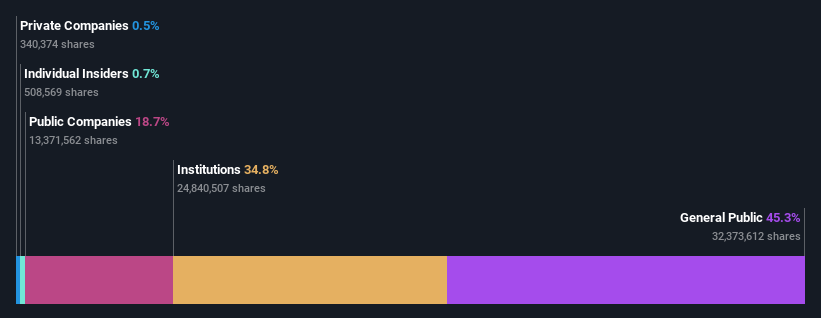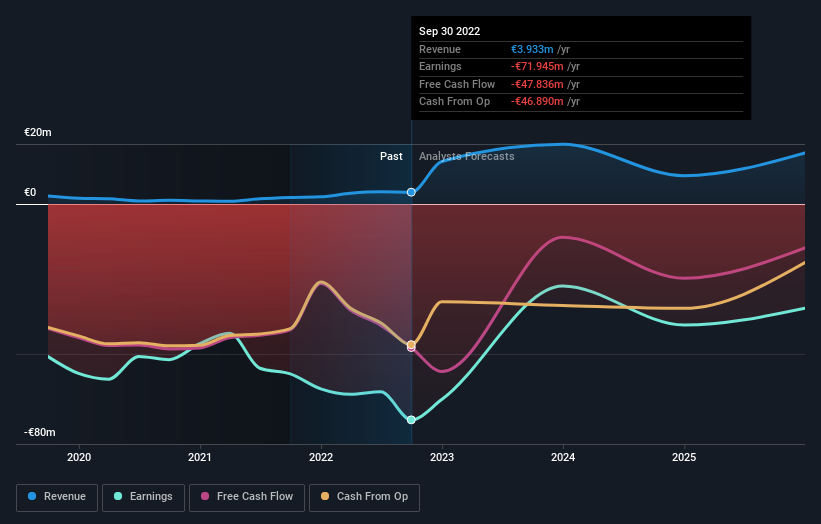Individual investors account for 45% of ProQR Therapeutics N.V.'s (NASDAQ:PRQR) ownership, while institutions account for 35%
To get a sense of who is truly in control of ProQR Therapeutics N.V. (NASDAQ:PRQR), it is important to understand the ownership structure of the business. The group holding the most number of shares in the company, around 45% to be precise, is individual investors. Put another way, the group faces the maximum upside potential (or downside risk).
Institutions, on the other hand, account for 35% of the company's stockholders. Insiders often own a large chunk of younger, smaller, companies while huge companies tend to have institutions as shareholders.
Let's delve deeper into each type of owner of ProQR Therapeutics, beginning with the chart below.
Check out our latest analysis for ProQR Therapeutics
What Does The Institutional Ownership Tell Us About ProQR Therapeutics?
Many institutions measure their performance against an index that approximates the local market. So they usually pay more attention to companies that are included in major indices.
ProQR Therapeutics already has institutions on the share registry. Indeed, they own a respectable stake in the company. This can indicate that the company has a certain degree of credibility in the investment community. However, it is best to be wary of relying on the supposed validation that comes with institutional investors. They too, get it wrong sometimes. When multiple institutions own a stock, there's always a risk that they are in a 'crowded trade'. When such a trade goes wrong, multiple parties may compete to sell stock fast. This risk is higher in a company without a history of growth. You can see ProQR Therapeutics' historic earnings and revenue below, but keep in mind there's always more to the story.
ProQR Therapeutics is not owned by hedge funds. Eli Lilly and Company is currently the company's largest shareholder with 19% of shares outstanding. Privium Fund Management BV is the second largest shareholder owning 7.5% of common stock, and Adage Capital Management, L.P. holds about 4.6% of the company stock.
A closer look at our ownership figures suggests that the top 15 shareholders have a combined ownership of 50% implying that no single shareholder has a majority.
Researching institutional ownership is a good way to gauge and filter a stock's expected performance. The same can be achieved by studying analyst sentiments. There are plenty of analysts covering the stock, so it might be worth seeing what they are forecasting, too.
Insider Ownership Of ProQR Therapeutics
The definition of an insider can differ slightly between different countries, but members of the board of directors always count. Company management run the business, but the CEO will answer to the board, even if he or she is a member of it.
I generally consider insider ownership to be a good thing. However, on some occasions it makes it more difficult for other shareholders to hold the board accountable for decisions.
Our data suggests that insiders own under 1% of ProQR Therapeutics N.V. in their own names. It seems the board members have no more than US$1.4m worth of shares in the US$197m company. Many tend to prefer to see a board with bigger shareholdings. A good next step might be to take a look at this free summary of insider buying and selling.
General Public Ownership
With a 45% ownership, the general public, mostly comprising of individual investors, have some degree of sway over ProQR Therapeutics. This size of ownership, while considerable, may not be enough to change company policy if the decision is not in sync with other large shareholders.
Public Company Ownership
We can see that public companies hold 19% of the ProQR Therapeutics shares on issue. We can't be certain but it is quite possible this is a strategic stake. The businesses may be similar, or work together.
Next Steps:
It's always worth thinking about the different groups who own shares in a company. But to understand ProQR Therapeutics better, we need to consider many other factors. Case in point: We've spotted 3 warning signs for ProQR Therapeutics you should be aware of, and 1 of them is a bit unpleasant.
But ultimately it is the future, not the past, that will determine how well the owners of this business will do. Therefore we think it advisable to take a look at this free report showing whether analysts are predicting a brighter future.
NB: Figures in this article are calculated using data from the last twelve months, which refer to the 12-month period ending on the last date of the month the financial statement is dated. This may not be consistent with full year annual report figures.
Have feedback on this article? Concerned about the content? Get in touch with us directly. Alternatively, email editorial-team (at) simplywallst.com.
This article by Simply Wall St is general in nature. We provide commentary based on historical data and analyst forecasts only using an unbiased methodology and our articles are not intended to be financial advice. It does not constitute a recommendation to buy or sell any stock, and does not take account of your objectives, or your financial situation. We aim to bring you long-term focused analysis driven by fundamental data. Note that our analysis may not factor in the latest price-sensitive company announcements or qualitative material. Simply Wall St has no position in any stocks mentioned.
Join A Paid User Research Session
You’ll receive a US$30 Amazon Gift card for 1 hour of your time while helping us build better investing tools for the individual investors like yourself. Sign up here


